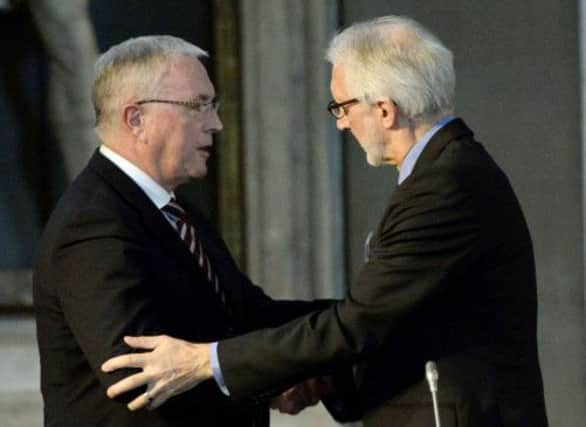Cycling: Brian Cookson ends McQuaid UCI reign


Cookson won by 24 votes to 18 in the vote that took place towards the end of a long and chaotic UCI congress in Florence after an acrimonious campaign with mud-slinging from both camps.
“It is a huge honour to have been elected president of the UCI by my peers and I would like to thank them for the trust they have placed in me today,” a calm Cookson said in his post-election speech as McQuaid, chairing the congress, looked stunned.
Advertisement
Hide AdAdvertisement
Hide Ad“The campaign to get to this point has been intense but I am under no illusion that the real work starts now. So I call on the global cycling community to unite and come together to help ensure that our great sport realises its enormous potential.
“This is the vision that will drive and focus my activities over the next four years.”
Cycling is still reeling from the Lance Armstrong doping scandal, during which the credibility of the UCI under McQuaid and his predecessor Hein Verbruggen has been questioned, notably by the US and World Anti-Doping agencies.
British Cycling president Cookson, backed by Russian oligarch and Katusha team owner Igor Makarov, had promised to change the way the sport is governed and create an independent anti-doping authority.
US Anti-Doping Agency (USADA) chief executive Travis Tygart, the man behind Armstrong’s downfall, welcomed Cookson’s win over McQuaid, who had called into question USADA’s evidence and methods following the investigation into the American rider.
“The outcome of the UCI election sends a powerful message that sport leaders who fail to fully protect the rights of clean athletes and the integrity of their sport will be held accountable,” Tygart said in a statement.
“We are confident that as president, Mr Cookson will take the decisive action needed, so that cycling can truly unshackle itself from the past and pursue a clean culture for future generations of cyclists.”
Irishman McQuaid had been seeking a third consecutive term as president but the congress began with discussions over his eligibility to stand in the election because he was not nominated by his home federation as required by the UCI constitution.
Advertisement
Hide AdAdvertisement
Hide AdHis candidacy was backed by Thailand and Morocco, which McQuaid said made him eligible, a point reiterated by two lawyers from Switzerland, where the UCI is based. No details were given as to who had hired the lawyers.
Following a confusing morning at the majestic Salone dei Cinquecento in Florence’s stately Palazzo Vecchio, which housed the office of 16th-century Italian politician Niccolo Machiavelli, a planned vote on a change to the UCI constitution making it clear McQuaid could stand in the election plunged into chaos.
New Zealand delegate Richard Leggat suggested the vote on constitution changes be held next year after the federations had been consulted.
The meeting then took on a surreal tone with delegates, and the watching media, at times unclear what congress was actually being asked to vote on.
Eventually, after heated debate, a few laughs echoed around the room as the 42 delegates agreed to a secret vote on whether voting on constitutional changes should take place.
Almost inevitably, the result was 21-21 and McQuaid agreed there would be no vote on constitutional changes because there was no absolute majority, still leaving most of the media in a state of confusion as to his eligibility.
After five hours of argument and apparent indecision frustration began to creep in with an Algerian delegate telling the congress: “Are we here to vote if we should respect the rules? It’s a lack of respect. We’re also here to see some cycling and we’re going to miss the (Under-23) race.”
In the end, it was down to Cookson, who in his pre-election speech had pointedly mentioned his nomination from his national federation, to remind the congress what they were there for, saying: “We’ve had enough of this. I propose that we go straight to the vote between the two candidates.”
It was a bold move that ultimately paid off.